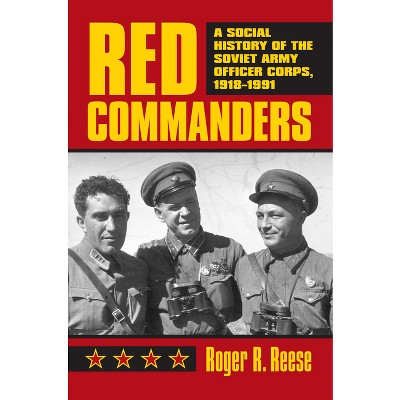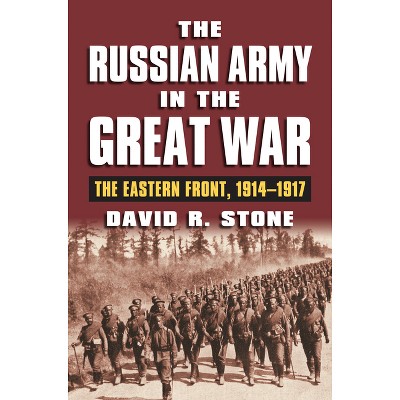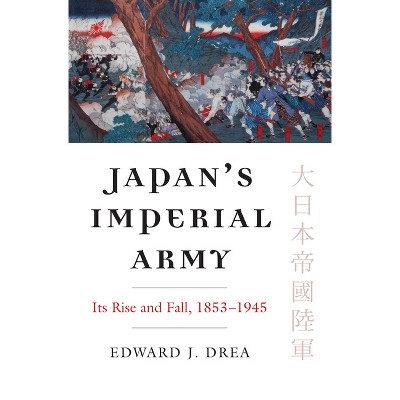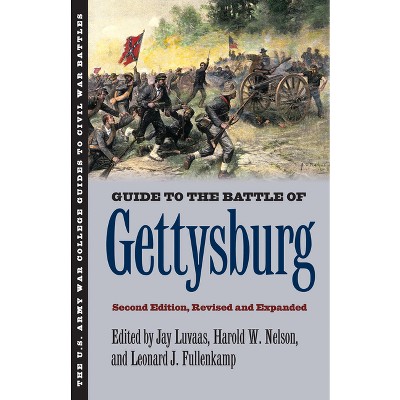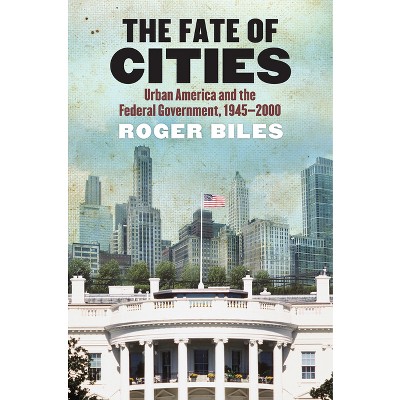The Imperial Russian Army in Peace, War, and Revolution, 1856-1917 - by Roger R Reese (Hardcover)

About this item
Highlights
- In December 1917, nine months after the disintegration of the Russian monarchy, the army officer corps, one of the dynasty's prime pillars, finally fell--a collapse that, in light of World War I and the Bolshevik Revolution, historians often treat as inevitable.
- Author(s): Roger R Reese
- 520 Pages
- History, Russia & the Former Soviet Union
Description
About the Book
The first book length study that tells the story of the Russian soldier in the first years 1856-1917 as well as officers other than general staff officers.Book Synopsis
In December 1917, nine months after the disintegration of the Russian monarchy, the army officer corps, one of the dynasty's prime pillars, finally fell--a collapse that, in light of World War I and the Bolshevik Revolution, historians often treat as inevitable. The Imperial Russian Army in Peace, War, and Revolution, 1856-1917 contests this assumption. By expanding our view of the Imperial Russian Army to include the experience of the enlisted ranks, Roger R. Reese reveals that the soldier's revolt in 1917 was more social revolution than anti-war movement--and a revolution based on social distinctions within the officer corps as well as between the ranks. Reese's account begins in the aftermath of the Crimean War, when the emancipation of the serfs and consequent introduction of universal military service altered the composition of the officer corps as well as the relationship between officers and soldiers. More catalyst than cause, World War I exacerbated a pervasive discontent among soldiers at their ill treatment by officers, a condition that reached all the way back to the founding of the Russian army by Peter I. It was the officers' refusal to change their behavior toward the soldiers and each other over a fifty-year period, Reese argues, capped by their attack on the Provisional Government in 1917, that fatally weakened the officer corps in advance of the Bolshevik seizure of power. As he details the evolution of Russian Imperial Army over that period, Reese explains its concrete workings--from the conscription and discipline of soldiers to the recruitment and education of officers to the operation of unit economies, honor courts, and wartime reserves. Marshaling newly available materials, his book corrects distortions in both Soviet and Western views of the events of 1917 and adds welcome nuance and depth to our understanding of a critical turning point in Russian history.Review Quotes
"Reese's comprehensive social history takes readers beyond the battlefield to examine living conditions, military education, and officer-soldier relations in the late Imperial Russian Army. He argues that the officer corps' incompetence, abusive behavior, and reactionary attitudes eventually drove the soldiery to revolt. Thorough, critical, and well written, The Imperial Russian Army in Peace, War, and Revolution, 1856-1917 challenges numerous myths and presents a provocative new explanation for Russia's collapse in 1917."--Paul Robinson, author of Grand Duke Nikolai Nikolaevich: Supreme Commander of the Russian Army
"Reese's informative tome, which also includes some interesting parallels with the armies of other European great powers at the time, will appeal primarily to readers with an interest in Russian military history, the Great War, and the Revolution of 1917."--Canadian Journal of History
"Reese must be congratulated on this magisterial effort, which is an exemplary work of the war and society approach to military history."--H-Net Reviews
"An important addition to the field of Russian history and the study of World War I, and furthermore, the book presents a fascinating insight into the life and opinions of the Russian soldier that is generally lacking in western histories covering this period."--Journal of Military History
"An important read for those with an interest in Russian military history, the Great War, or what makes armies tick."--New York Military Affairs Symposium Review
"Reese's new study provides both a useful description of conditions in the army and a provocative set of assertions concerning the effects of those conditions."--Russian Review
Shipping details
Return details
Trending Non-Fiction






